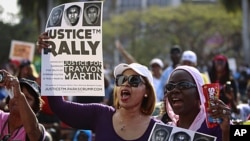The fatal shooting of unarmed African American teenager in Florida in February is focusing fresh attention on race in the United States. Some Americans believe he was a victim of racial profiling, singled out solely because he was black. Supporters of the white, Hispanic neighborhood watch volunteer who shot the young man deny this.
Calls for action
Across the United States, there are calls for action in the killing of Trayvon Martin.
Martin is the 17-year-old shot dead in a confrontation with neighborhood watch volunteer George Zimmerman.
Martin's parents say their son was murdered. Zimmerman claims self-defense. Local, state and federal authorities are investigating, but have made no arrests.
Benjamin Crump is an attorney who represents Martin's family. "We honestly believe that Trayvon Martin is dead today because he was racially profiled," he stated.
Zimmerman's supporters deny that, but many Americans insist that's the case.
Representative Rush makes a point
Representative Bobby Rush is among members of Congress calling for a federal commission to study what they say is race-based injustice. "Racial profiling has to stop Mister Speaker. Just because someone wears a hoodie does not make them a hoodlum," he said.
Martin was wearing a hooded sweatshirt known as a hoodie the night he died. Now thousands of people are wearing them as a protest against what they see as racial stereotyping.
"I feel like I should be able to go outside and wear my hoodie without worrying about this guy may be feeling this sort of way or that I may be threatening to this person," said Chris Bullock, a university student.
Racial profiling
Civil rights activists also cite what they call "driving while black". It refers to police allegedly targeting African Americans for traffic stops because they believe blacks are more likely to commit crimes.
Racial profiling violates equal protection laws. But many African Americans believe it is common, and are calling for change.
Greg Carr heads the Afro-American Studies Department at Howard University in Washington. "Politicians tend to respond to numbers and when you see numbers of people educating themselves as to the realities of racial profiling and then organizing themselves in ways that could lead to legislation," he stated. "It certainly could lead to lobbying and to an increase sensitivity in law enforcement and in general society "
Candance House attends a university in North Carolina. "It just kind of upsets me that we really judge people based on how they look and we don't really stop to judge their actions," she said. "And to see if they're really good people or not."
Some African American parents tell their children how to act if stopped by authorities. High school student Efrugene Baptist relays his mother's advice. "She taught me the safeties of going out on the streets and how anything can happen at any moment. So just always stay attentive and be aware of what was going on," he recalled.
Some say that advice can mean the difference between life and death.




